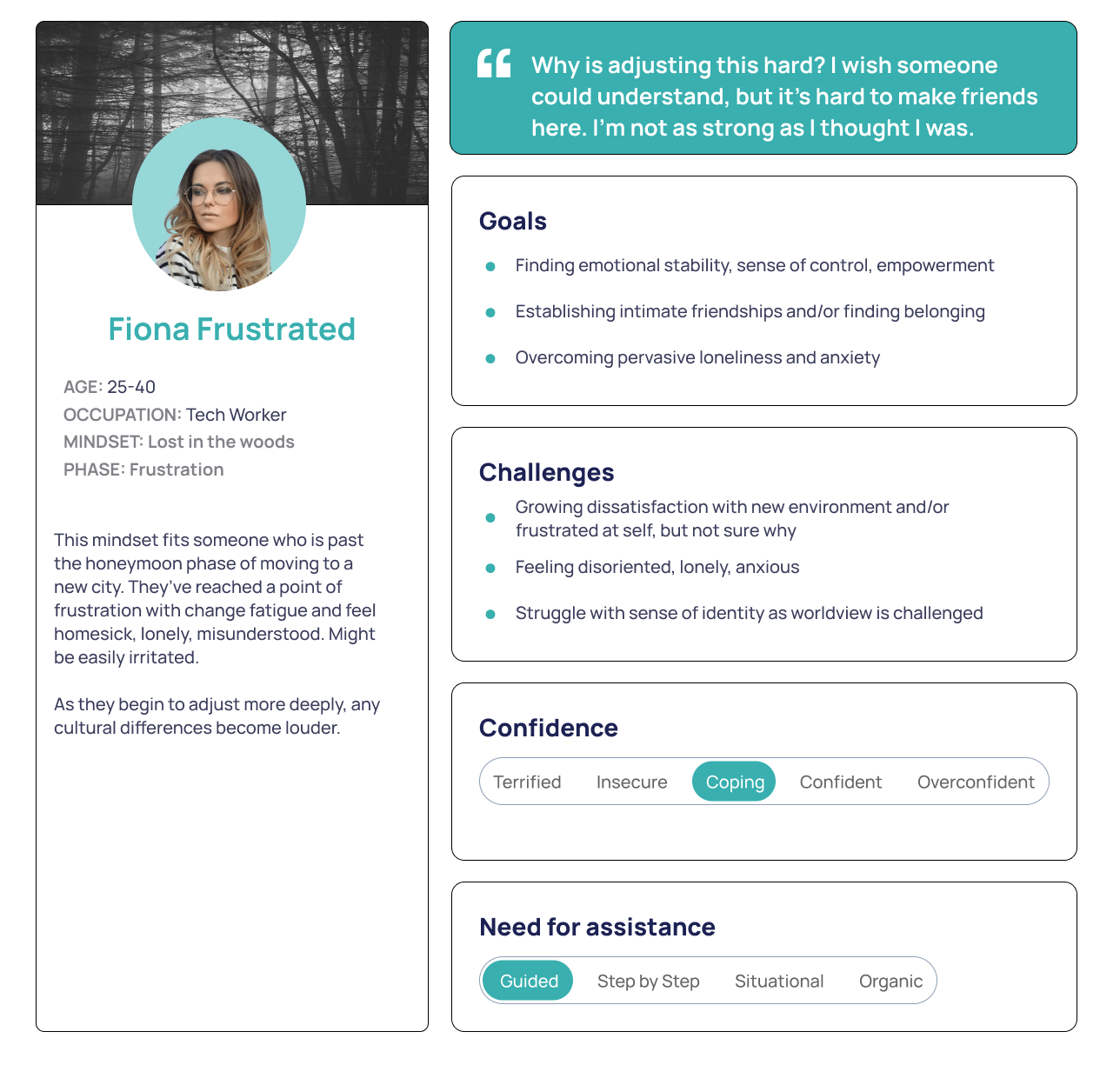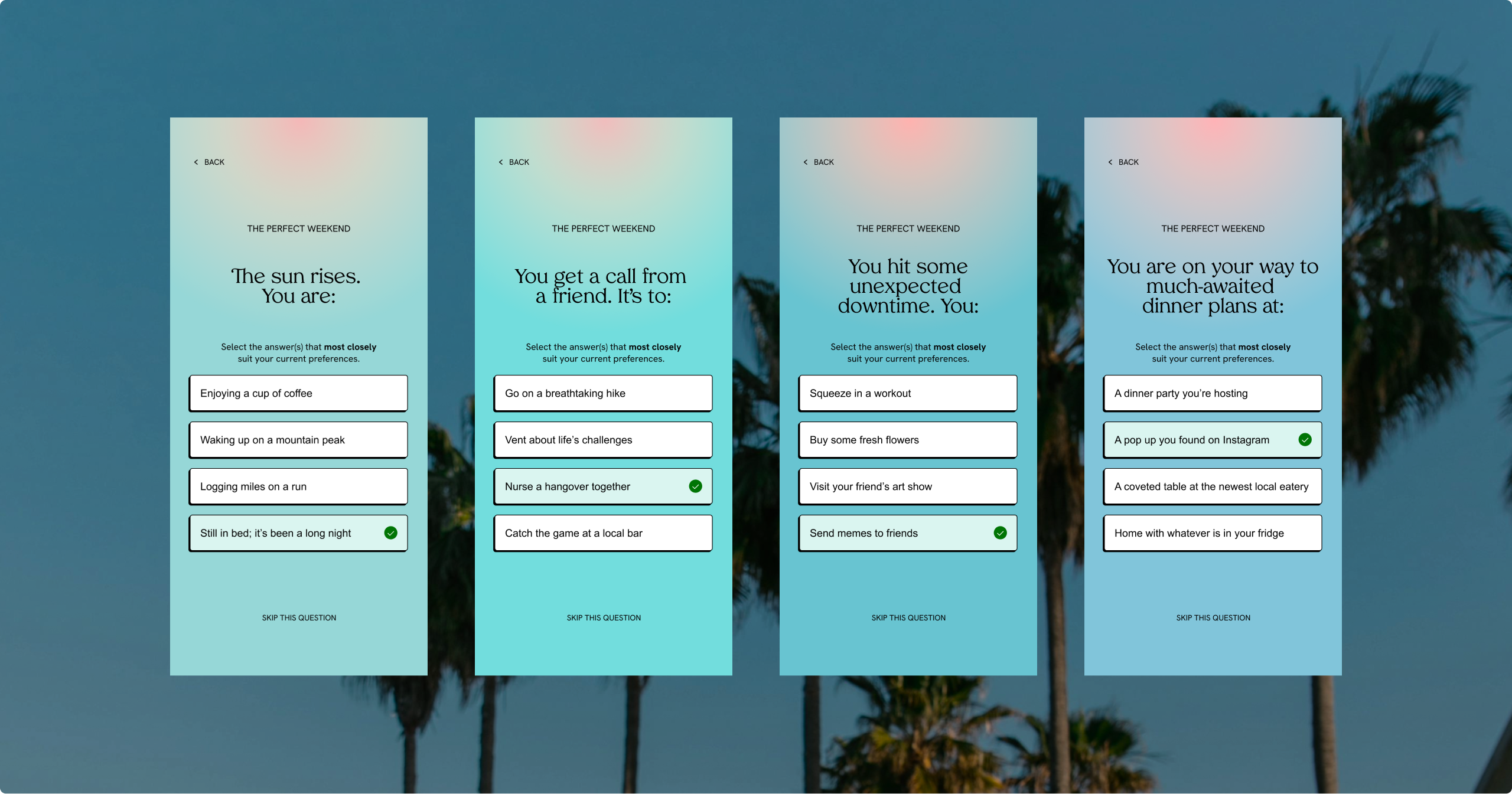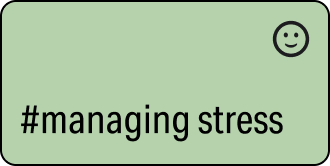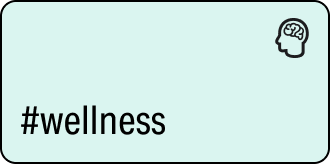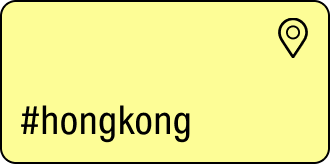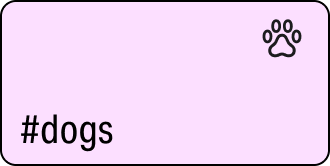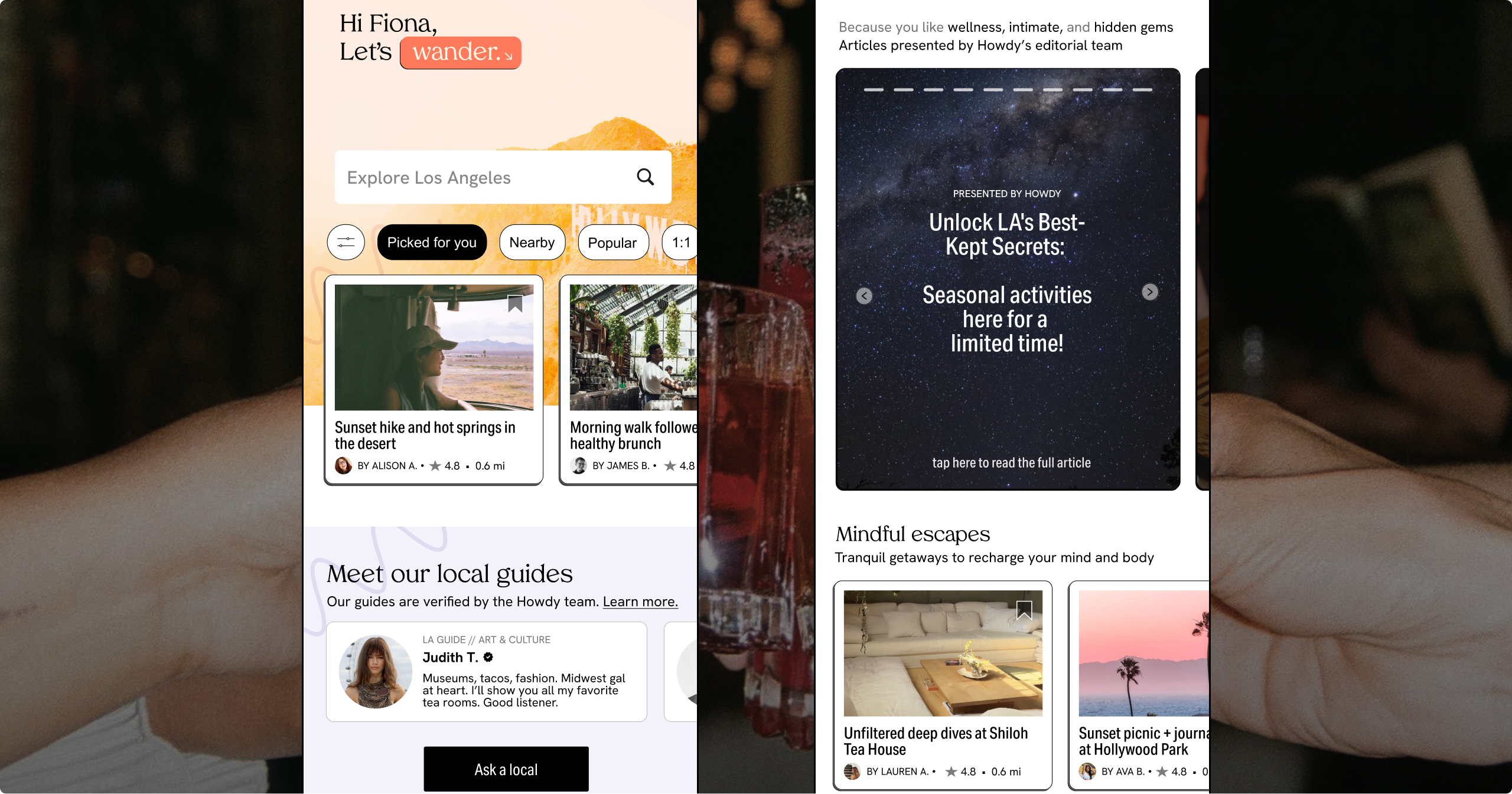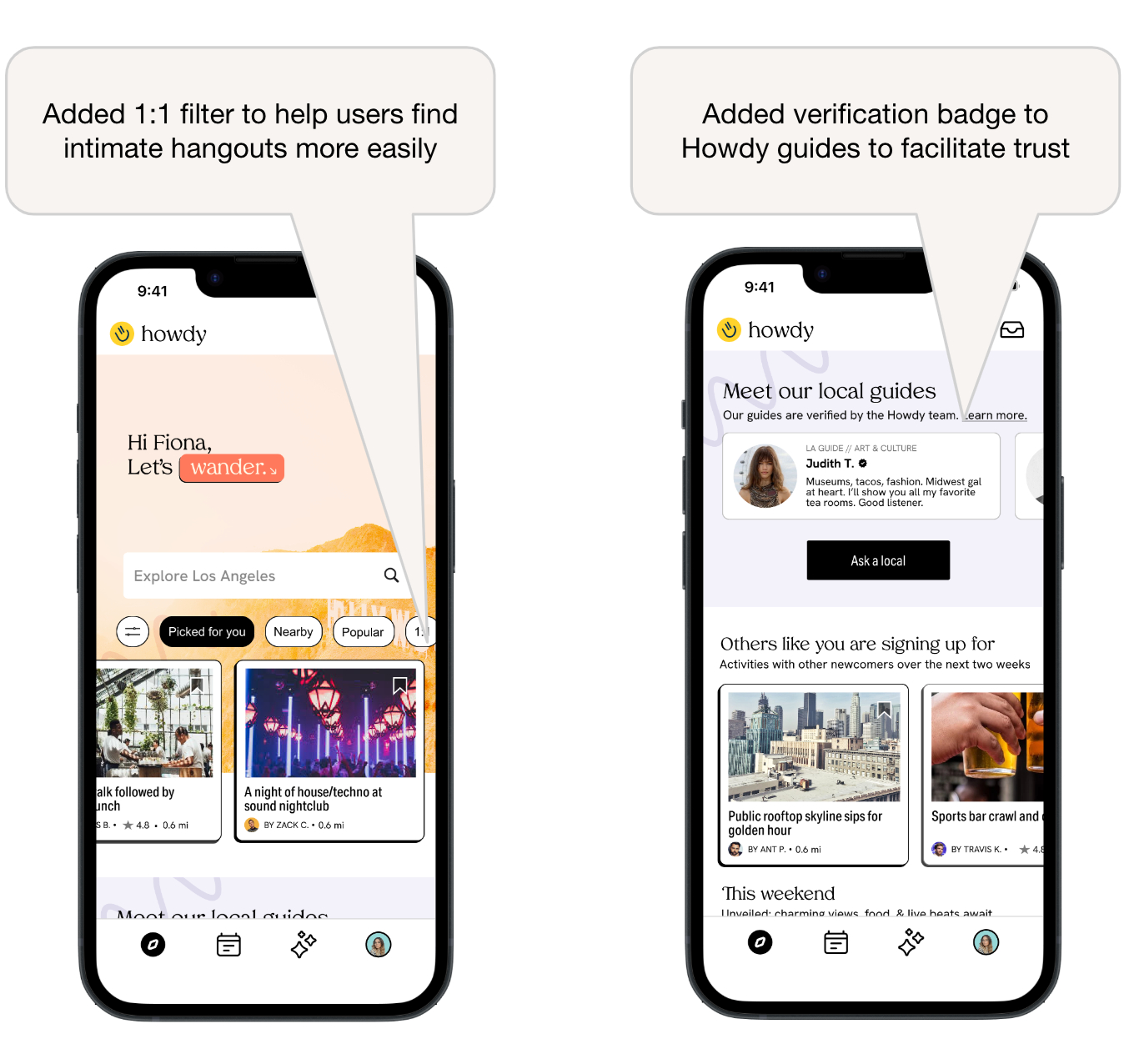
Howdy
Howdy is a marketplace linking newcomers with locals via curated experiences. Locals serve as city hosts, offering tailored itineraries to acclimate newcomers to their new city and culture. Newcomers can access events, connect with locals, and seek guidance

OVERVIEW
Life after relocation can be disorienting
The COVID-19 pandemic has had a significant impact on relocation patterns. As companies adopt “work from anywhere” policies, more people are taking advantage of this newfound flexibility by relocating to different cities or regions. However, moving can come with unexpected emotional costs that lengthen one's transition period after a move - leading many newcomers to experience loneliness & change fatigue.
GOAL
Design a solution that makes moving to a new city easier for people
METHODS
Problem definition & framing
User + market research
User interviews
Personas
Wireframes & prototyping
Usability testing
Success measurement
BUSINESS PROBLEM:
Loneliness and change fatigue are an underaddressed area when it comes to moving to a new city.
00. SOLUTION PREVIEW
A platform that connects newcomers to locally curated expertise and experiences
• An mobile app that connects newcomers to locals
• Newcomers reduce mental load in navigating and a new city and making new friends
• Locals meet new people and make money in tips from newcomers
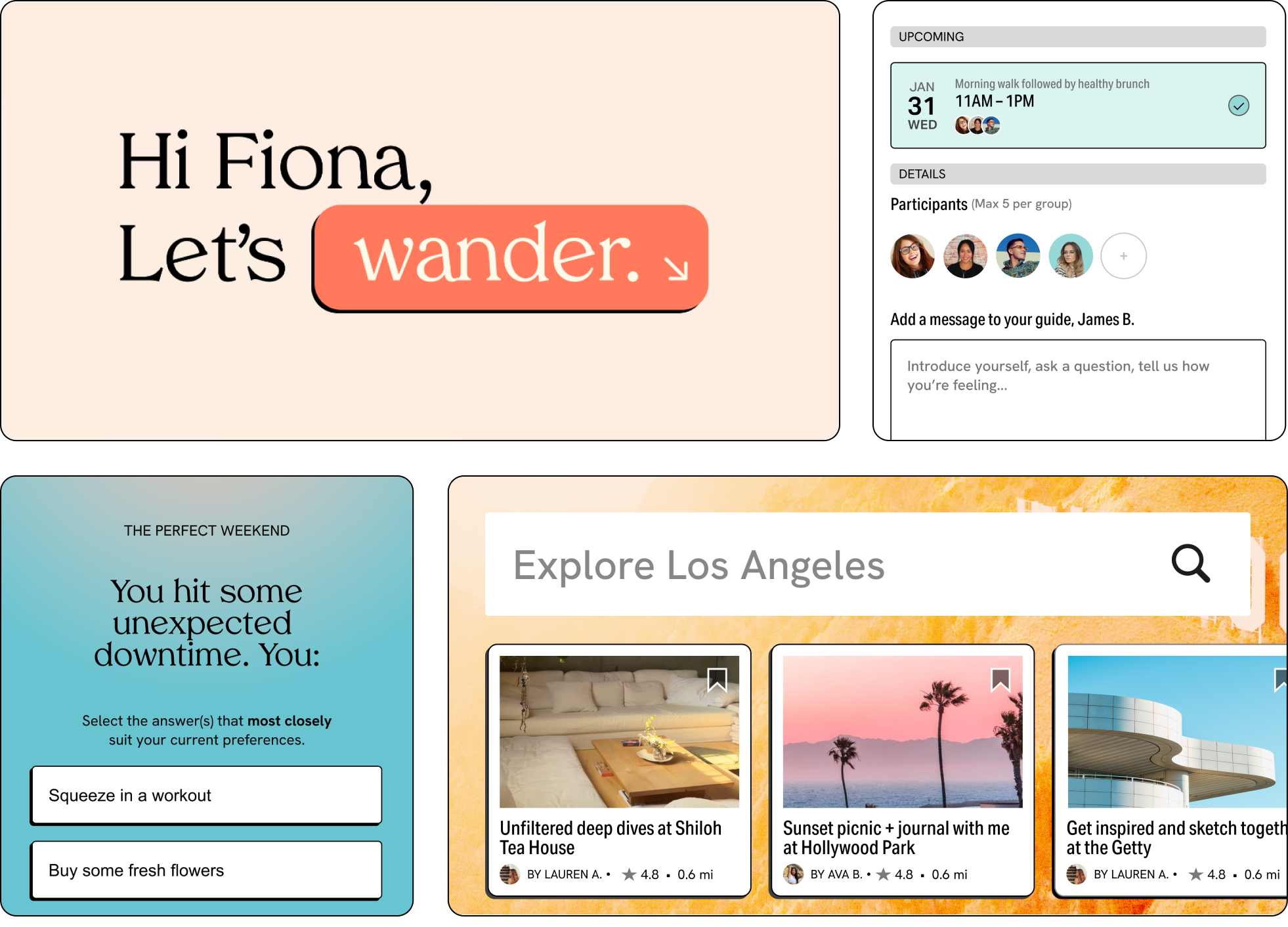
Initial Outcomes
80%
successfully completed the onboarding + booking tasks within the targeted time frame
20
Net promoter score
(0 - 20 = good, 20+ is favorable)
100%
reported that onboarding feels engaging
01. DISCOVERY | WHAT'S THE PROBLEM
Hypothesis: Psychological challenges are an underaddressed opportunity for people relocating
When I think of moving, logistics seems like the most obvious challenge. But I wanted to explore the full breadth of the problem space. According to a 2020 Harvard study, there are 4 typical challenges to relocation:
Occupational
New job duties, workplace & licensing requirements
Economic
Living & travel expenses
Regulatory
Visas constraints, government paperwork
Psychological
Being far from friends, family, and a familiar culture & lifestyle
A "SOFT" PROBLEM
I hypothesized that psychological challenges during relocation are often overlooked, as immediate concerns like logistics and finances take priority. These challenges are also hard to address due to individual and cultural differences, making simple solutions elusive.
With that in mind, I had my research goal.
02. RESEARCH | USER INTERVIEWS
Understand the psychological challenges people face after relocating (are there any?)
Interview Insights
n=8
• Moved regionally and internationally
• 26-45 yo working professionals
• LA, SF, NY, UK, Japan
Using affinity mapping, I grouped pain points from interviews into four categories, then distilled into two broader themes – loneliness and change fatigue.

80% of participants noted that once in a new city, they’d first reach out to any local friends or acquaintances they know to show them around before choosing exploring on their own.
Familiar Faces

60% of participants reported being surprised at how adjusting to their new surroundings tested their sense of identity, independence, and mental health.
Blindsided

60% of participants reported feeling both excited yet exhausted. Adjusting to a new environment where rules, routines, and personal identity are not yet established created anxiety and in some cases, paranoia.
Disoriented

80% of participants experienced varying degrees of loneliness the lasted from brief moments to long periods. If a friend or family member wasn’t physically available, participants would travel to see them.
Loneliness
Huey, 32 years old, on moving from California to Japan
"It's easier to date than to make new friends. There's a 'mental tax' for locals [to interact with you] - you're not like them, so it's not worth it."
Lauren, 33 years old, on moving interstate
"It's exhausting when everything is new. My adjustment wasn't linear - it felt fun yet laced with anxiety throughout."
Relocation: An Unexpected Journey
📈📉 While there is a general path towards eventual acclimation, where you are in the relocation journey can fluctuate at any moment due to the high volume of small changes that require continual adjustment. As a result, emotions can come in waves and cycles, which are tough to pin down.

I'm going on an adventure!
Market gaps
02. RESEARCH | BRINGING IT TOGETHER
People struggle with loneliness and change fatigue when there are no straightforward answers
💔 According to the Happiness Lab, deep relationships, light social connection, and a sense of community are all needed to for people to achieve long term happiness. Without these factors, people will experience 3 different types of loneliness: intimate, relational and collective loneliness.

I'm going to Mordor alone.
Three types of loneliness
A competitive analysis of common social friending & dating apps revealed:
• Difficulty for newcomers to find "good" company who can help them navigate a city
• Misaligned expectations for 1:1 dates and events
• Meetup fatigue; people gave up on an app completely if the first few dates sucked
🌧️ Excitement can quickly turn into anxiety. A person may feel optimistic and excited living in a new country one moment, 'till they receive a government notice in a foreign language which triggers a wave of culture shock, overwhelm, and isolation in the next. Oftentimes, good and bad feelings coexist simultaneously which can lead to overwhelm.

I can't recall the taste of food, nor the sound of water, or the touch of grass.
Emotions fluctuate constantly
03. DEFINE | MINDSETS
People's attitudes towards adjustment are situational
2 personas, or "mindsets"
Instead of personas, I used Designit's "mindsets" framework which help frame the spectrum of emotional responses one might experience within the same context. These mindsets are designed to model how attitudes of a person might fluctuate and/or evolve over time.
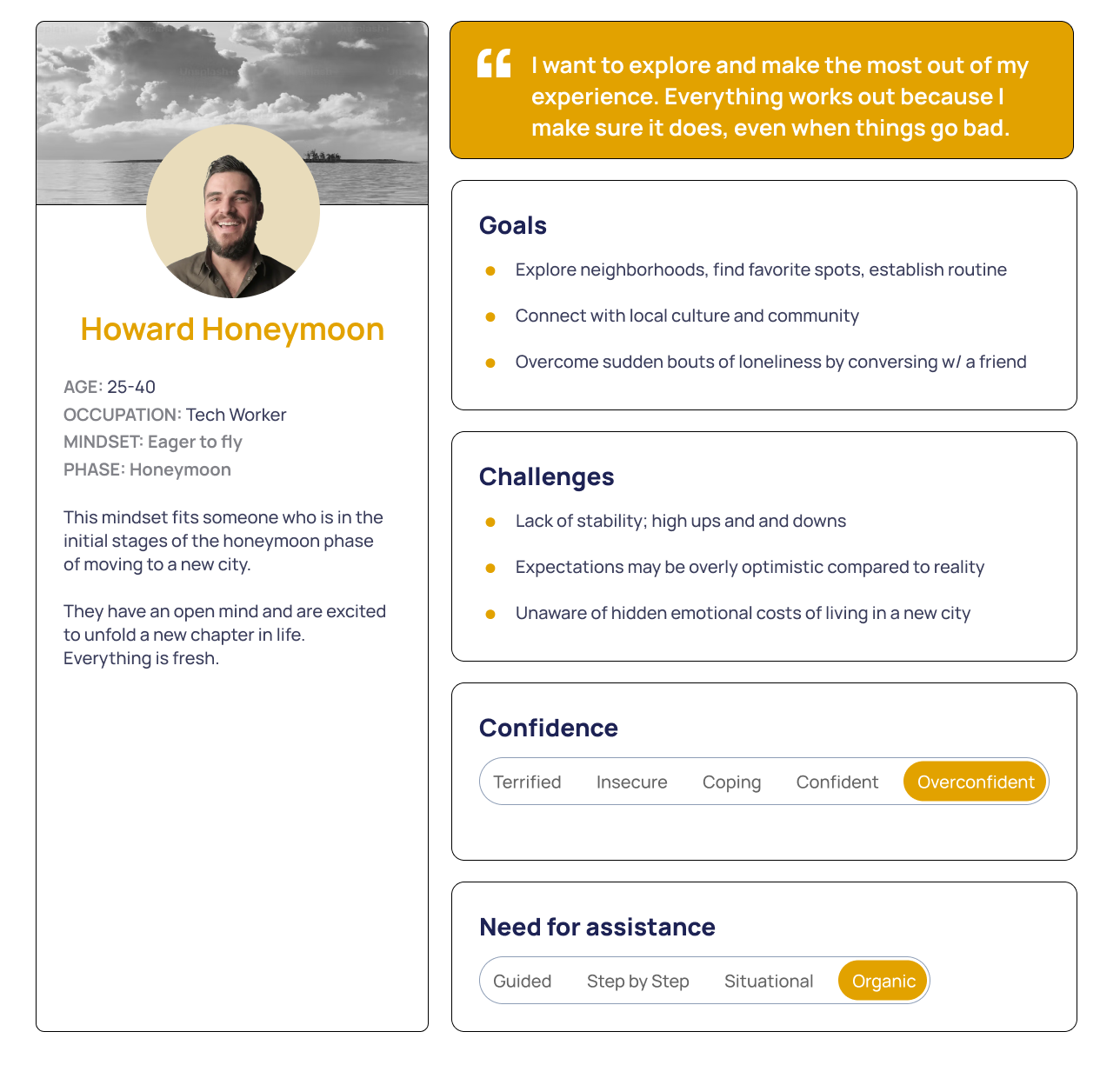
03. DEFINE | REFRAMING THE PROBLEM
Making your new place feel like home
Before ideating solutions, it was important to define what success would look like. I unpacked what it means to feel "at home" – finding friendship, community, and routine.
How might we...
🤔 Help newcomers discover and navigate a new city and culture as easily as hitting up a friend?
🤔 Give locals an opportunity to meet new people and monetize their expertise?
🤔 Help newcomers connect with locals and other newcomers based on shared interests and intentions?
"The world is not in your books and maps. It’s out there!"
Using the analogies ideation method, I landed on a spectrum of ideas around "onboarding" a newcomer to a new city – in the same way you might when you start a new job, or reach out to someone you know. After all, if a new company wants to see you succeed, why shouldn't this we expect the same from our communities? This led me to two offerings:
-
Low Touch: Exploring with a local for a day
-
High Touch (out of scope): Having a dedicated buddy for a month (timing constraint)
Use Cases
03. DEFINE | IDEA GENERATION
How can exploring a new city feel as easy as hitting up someone you know?
🗯️ As a newcomer, I want to discover the perfect activity to match my mood and interests, even when I have no idea what I'm looking for
🗯️ As a newcomer, I want to learn about my city safely, meet other newcomers, while also getting a local's perspective
I came up with a list of features that would become the Howdy marketplace MVP. To refine my idea, I referred back to our HMW's.
Feature Matrix
🗯️ As a local, I want to meet new people while also enjoying activities I already love
🗯️ As a local, I want to feel appreciated for my efforts with a thank you or a tip
04. DESIGN | GUIDELINES
Design principles
Establishing design principles ensures we make consistent design decisions that reflect the needs of our users and business goals. It guides execution, critique, and reduces rework.
Speak human
Make app feel like a companion. Use approachable, human language to build trust and make interactions feel casual, natural, and empathetic
Simplify discovery
Make navigating uncertainty effortless through personalized suggestions, contextual cues. Surface just enough information to guide decisions confidently and reduce overwhelm
Design for delight
Create moments of surprise and joy that enhance the user journey. Focus on thoughtful details and seamless interactions
04. DESIGN | KEY SCREENS
Conversational onboarding
Low-mid-hi

Personality Assessment
In order to match people and activities by shared interests and values, I explored an onboarding process that mimics a dynamic personality quiz, considering how to extrapolate a newcomer's behavior and interests in order to serve personalized recommendations. This would require some technical "guesswork" which challenges my desire for precision, but it aligns with the design principle of making things feel easy, conversational, and delightful.
04. DESIGN | KEY SCREENS
Discovering things to do
By intention
For our frustrated users who don't know what they want, they can start by reflecting on the mood or intention in order to discover activities that fit their current vibe.
By interest
Micro-genres are generated titles based on metadata, descriptions, images, and other types of inputs on each activity. It would be interesting to consider how AI can be used create personalized categories that resonate with the user based on observed and self-reported preferences, routine, and lifestyle:
• Co-Work & Coffee: Quiet Cafes w/ Strong Wifi
• Snug Corners to Chill
• Recharge & Dine: Low-Energy Meal Connections
• Golden Hour Moments for Lazy Days
• Last Minute Errands for Night Owls
These titles provide a highly personalized way to help cater to individual tastes, making it easier for newcomers to discover activities, places, and people that resonate with them.
By hyper-specific genres
✨ Powered by AI ✨
Sign up or propose a time
Newcomers can join scheduled hangouts with host approval or suggest times that fit both their and the host's availability.
04. DESIGN | KEY SCREENS
Scheduling
05. TESTING | INSIGHTS
Trust, safety, and clarity were top concerns
After creating the prototype, I led moderated tests and a survey to gather feedback, observing real-time interactions. Four key themes emerged—trust, safety, awareness, and personalization—impacting meaningful interactions. I brainstormed fixes and prioritized them with an impact-effort matrix to guide my revisions.
Trust was a very valid concern from our participants – they need to be assured that our guides are vetted and safe. Some also felt more comfortable interacting 1:1. See changes below.
Build trust through verification badges
and 1:1 hangouts
One key revision
06. OUTCOMES | KEY METRICS
Target users found the solution easy and engaging to use
80%
(4 out of 5 testers) successfully completed the onboarding + booking tasks within the targeted time frame
20
Net promoter score
(0 - 20 = good, 20+ is favorable)
100%
(5 of 5 testers) reported that
onboarding feels engaging

End? No, the journey doesn't end here.
View next project →
Streamlining document verification to minimize delays in health coverage
